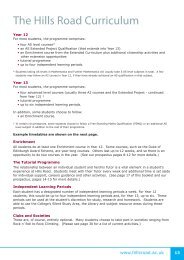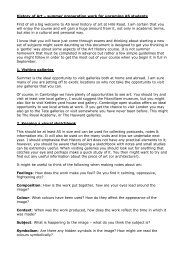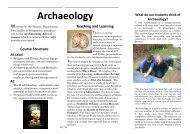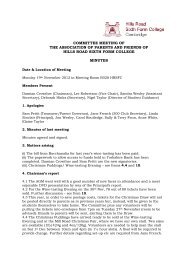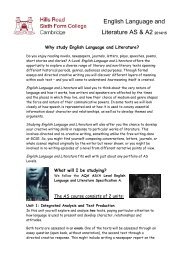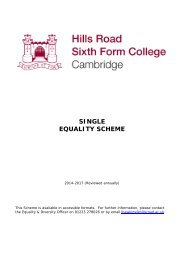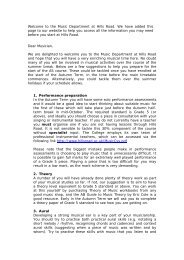The Phoenix - Hills Road Sixth Form College
The Phoenix - Hills Road Sixth Form College
The Phoenix - Hills Road Sixth Form College
Create successful ePaper yourself
Turn your PDF publications into a flip-book with our unique Google optimized e-Paper software.
<strong>The</strong> <strong>Phoenix</strong> | 4th April 2014Racism in SportBy Darren D’SouzaRacism has been prevalentthroughout the history of sport,marring contests and symbolisingmuch more than winninga game – about fighting for therights of all those who have seentheir dreams shattered simplybecause of the colour of their skin.<strong>The</strong> 1936 Berlin Olympicswere an opportunity for NaziGermany to showcase the superiorityof the so-called masterrace, or Aryans, and this wasembodied in their blonde, blueeyedlong jumper Luz Long: however,he eventually placed silverto none other than the USA’sAfrican-American Jesse Owens,who won four gold medals at theGames – the long jump, 100 metres,200 metres and 4 x 100 metresrelay, in the process breakingnumerous Olympic recordsand embarrassing the Nazi ideology– Hitler refused to place thegold medal around Owens’ neck– however this was not directedat Owens personally, rather theOlympic committee told Hitlerto maintain neutrality andeither congratulate all the victorsor none. He chose the latter.In an unprecedented actof solidarity, the first person tocongratulate Jesse Owens onhis long jump victory was noneother than the German silvermedallist Luz Long, and the twoposed together for photos beforewalking arm-in-arm towards thedressing room, prompting Owensto say “It took a lot of courage forhim to befriend me in front ofHitler... You can melt down allthe medals and cups I have andthey wouldn't be a plating on thetwenty-four karat friendship thatI felt for Luz Long at that moment".Remarkably, Owens neverwould have made the final if itwere not for Long; he had faultedhis first two jumps (by oversteppingthe board) and would havebeen disqualified if he done soa third time. Long introducedhimself to Owens and advisedhim to make a mark well beforethe board to ensure he qualified– the sportsmanship shown wasunparalleled not only because ofthe racial differences, but alsobecause Long was consideredOwens’ most serious contenderwith a chance of beating him.Life for Owens when hereturned to his homeland wasthe same as before – to the extentthat at a dinner at New York’sWaldorf-Astoria hotel, recognisingand celebrating his achievements,he could not enter via thefront door, but had to use the servicelift instead, only serving tohighlight the deeply ingrainedracial prejudice in the UnitedStates throughout its history.In 1968, two more blackAmerican athletes made historyand gained worldwide attentionby winning gold (TommieSmith) and bronze (John Carlos)in the 200 metres; raisingthe black gloved fist to performthe Black Power salute on thepodium, whilst wearing blacksocks to symbolise black poverty.Silver medallist Peter Normanwore a civil rights badge tosupport them: however, the IOCbanned Smith & Carlos fromthe Games for life, and Normanwas dropped from the 1972 Australianteam despite actuallyhaving qualified 13 times over;as the Games were supposed tobe a politically neutral internationalforum for sport. Nazi salutesin 1936 were not seen aspolitical, but rather a “nationalsalute” (of Germany) that in aSports34competition of nations were permissible.When they returned,Smith and Carlos were subjectto abuse and even death threats,and Norman was criticised bythe Australian media too. <strong>The</strong>two Americans were pallbearersat Norman’s funeral in 2006.<strong>The</strong> 1968 Games were alsonotable for South Africa’s omissionas, due to the Apartheidregime, other African as well asEastern Bloc countries threatenedto boycott if they took part.1968 also saw South Africa embroiledin another race-relatedissue: the Basil D’Oliveira affair.Basil Lewis D’Oliveira (knownaffectionately as “Dolly”) was acricketer who was classified as“coloured” under the Apartheidregime and was therefore barredfrom playing first class cricketin the country. He emigrated toEngland in 1960 and became acitizen in 1964, making his debutfor the England national team in1966 against the West Indies.Through injury to Warwickshire’sTom Cartwright, D’Oliveira wascalled up to the England squadto tour his country of birth,South Africa but South Africa’sPrime Minister John Vorster,who had previously warned thathe would not be admitted – didjust that in September, saying“<strong>The</strong> MCC (England) team is notthe team of the MCC but of theanti-apartheid movement.” Savefor a select few, the South Africanpress criticised Vorster’s actionsas endangering the alreadyprecarious state of South Africansport. <strong>The</strong> MCC call off the tourbut in 1969, invite South Africato tour in the following year.Events such as theseserve to highlight the injusticesuffered by athletes – at thehands of national governments– through institutional policiesthat resulted in the suppressionof those whose lives outsidesport were deeply affected bydeep-rooted prejudices withintheir societies, and they faced astruggle to maintain their dignityand pride of who they werebecause of unchanging attitudes.Today, recent affairs suchas those involving Luis Suárez &Patrice Evra, John Terry & AntonFerdinand (football), show thatthe problem has not gone away.<strong>Form</strong>er Tottenham Hotspur &Arsenal player, Sol Campbellstated that had he been white, he“would have been England captainfor over 10 years” stirringup further controversy regardingthe grassroots to top level transitionfor black players in football.Ghanaian international Kevin-Prince Boateng famously walkedoff the pitch midway through afriendly against Pro Patria (as anAC Milan player at the time) inJanuary 2013 with the full backingof his teammates and clubpresident Silvio Berlusconi, latertweeting “Stop Racism Forever”.As sport continues to inspirepeople from all walks of lifeworldwide, offering hope throughthe legacy of the Olympic andParalympic Games and the forthcomingWorld Cup, it is quiteclear that prejudice of any form –including that of racism, has absolutelyno place in sport, and thementality of those who continueto shout it from the terraces orthe stands needs to be challengedand eradicated, and in its placefans and athletes alike mustshow tolerance and compassiontowards one another, as in theimmortal words of the late SouthAfrican hero Nelson Mandela:“Sport has the power to changethe world.It has the power to inspire, it hasthe power to unite people in away that little else does.It speaks to youth in a languagethey understand.Sport can create hope, whereonce there was only despair.It is more powerful than governmentsin breaking down racialbarriers.It laughs in the face of all typesof discrimination.”35 <strong>The</strong> <strong>Phoenix</strong> |4th April 2014Sports<strong>The</strong> Volatile Vincent TanBy Andrew BeckettIt’s fair to say a large share ofCardiff City’s media coverage inrecent months has been due toa certain Malaysian businessman.Vincent Tan with an estimatedworth of £1.3 billion, hasdominated the headlines withhis bizarre antics as Chairman ofthe club who returned to the topflight in 2013 after 51 years out.Most recently in January2014 the owner of Malaysia’sMcDonald’s franchise hit the papersafter expressing his disappointmentin ex-manager MalkyMackay’s spending. Mackaybrought the Danish striker AndreasCornelius to the team fora club record fee of around £7.6million. However in his thirdgame for the Bluebirds againstAccrington Stanley the 20 yearold was stretchered off after sustainingand ankle injury, whichresulted in the Dane missing thenext 3 months of fixtures. Evenafter coming back from injuryCornelius was still yet to scorefor the club, presumably explainingTan’s opinion of the purchaserevealed by a close source of his,“Mackay was instructed to go outand buy a Bentley. He got thefunds to get some top quality internationalplayers but Mr Tanfeels Mackay bought a Toyotainstead.”. One could argue Tan’soutspoken judgment of Mackay’spurchase is fairly misguided,due to Cornelius’s time out of thegame and the fact that he hasonly ever been brought on as asubstitute. Both of these factorscontribute to the striker arguablybeing unable to prove his worth.Also there were numerous signsto suggest Cornelius was easily aplayer worth the £7.6 million anda player of ‘Bentley’ standard:in the 2012/13 season Corneliuscontributed 20 goals to title winningCopenhagen’s campaign.On the 28th DecemberCardiff’s 26,896 seater stadiumwas the venue for anotherof Tan’s surprising stunts. In ahighly anticipated game againstSunderland: after just 6 minutesCardiff netted with a deflectedshot from Jordan Mutch, thenFraizer Campbell struck in thesecond from 12 yards out, leavingCardiff up 2-0 and in cruisecontrol with just 32 minutes leftto play. However to Cardiff’s dismayStephen Fletcher and JackColback each scored in the last10 minutes; allowing the BlackCats to return to the North-Eastwith a valuable point, leavingthe Bluebirds dumbfounded andbooed off by their fans. Complyingwith his unpredictability,boss Vincent Tan also was seenbooing, which stirred up muchmedia controversy and debate.As an outsider I find myselfconsistently finding Tan’santics amusing and interesting.However I do sympathise withthe individuals who actuallyhave to work with this unusualchairman, like Mackay and newCardiff boss Ole Gunnar Solskjær,as one can imagine it beingrather frustrating to workwith such an unpredictable man.Concussion in sport – what areBy Abbey Maclurethe risks?On the 10th November, Tottenhamkeeper Hugo Lloris was knockedunconscious after a collision withRomelu Lukaku during the premierleague fixture against Everton. Afteran examination from the Tottenhammedical staff, Lloris madethe decision to continue to play therest of the match. Sparking angryreaction from brain injury charities,with the Tottenham medical staffand coaches coming under scrutinyfor allowing Lloris to continueto play the match. It has added fuelto the already ongoing debate onthe rules surrounding concussionwithin football and other sports.Concussion has becomean important issue following thechanges to the rules of rugby. In theRugby Union, players who have receiveda head injury can now returnto the game after just five minutes,following a simple concussion testof walking in a straight line and answeringquestions on the date, theirlocation and the score of the match.In the past the laws on head injurieswere far more cautious – players withsuspected concussion were takenoff the pitch immediately and wereprevented from playing again for aminimum of five days. In the RugbyLeague, however, concussion testsare more rigorous - players cannotreturn to play rugby without passinga test, involving a pack of cards, regardlessof whether they pass it immediately,or after a week of recovery.<strong>The</strong> debate on the issue ofconcussion has been centred on thequestion: how serious are the risks?<strong>The</strong> expression ‘getting your bellrung’ is used casually to describethe injury which, in medical terms,takes on a far more serious name -‘minor traumatic brain injury.’ Braininjury charities have urged sportsmenand women to take the injuryseriously, as while some may take aknock and suffer no further consequences,for others concussion canhave a devastating impact on theirhealth. A tragic example is the deathof schoolboy Ben Robinson, 14,who died two years ago after sufferingmultiple concussions during aschool rugby match in Northern Ireland.Ben was knocked unconsciousafter several collisions during thegame and yet rather than being substituted,he was allowed to continuethe match. He collapsed at the endof the game and died later in hospital.His father, Peter Robinson,has urged to government to introducecompulsory lessons in schoolsthat focus on teaching childrenabout the dangers of concussion.Whilst the government havenot acted on this plea, Labour MPChris Bryant has called for an ‘urgentdebate’ on the dangers of concussionin sport, following the Lloriscontroversy. <strong>The</strong>re is also a callfor more education for the public onthese dangers. Neuropathologist DrWillie Stewart believes that there isa strong link between concussionand the onset of early dementia,and this risk is increased for manysportsmen. Whilst the world of boxinghas been aware of the dangersof head injuries for many decades,for other sports not closely linkedto head injuries, such as football,the issue is often brushed aside. FAlaws state that after suffering a headinjury, a player must be examinedby a doctor, who can then makethe decision on the pitch to let theplayer continue. In a post-match interview,Tottenham manager AndreVillas Boas said he “stood by” thedecision of club doctor, ShabaazMughal, to allow Lloris to continueplaying, claiming his medical staffhad been “poorly treated, badly respected”by the media. Head injurycharity Headway have described theclubs actions as “dangerous and irresponsible”implying that the rulessurrounding concussion and braininjuries need to be re-assessed.<strong>The</strong> debate on concussionwill continue for a time to come,with conflicting views on howeach sport should handle the issue.It’s widely agreed that educationis key - Peter Robinson’s pleafor concussion awareness lessonsmay have a life-saving impact ifintroduced. “[Ben] spoke to fourpeople that day and none of themwere overly concerned - becauseof a lack of awareness” says MrRobinson. He claims that had Benand his team-mates been awareof the dangers and the signs andsymptoms, he would still be alive.



